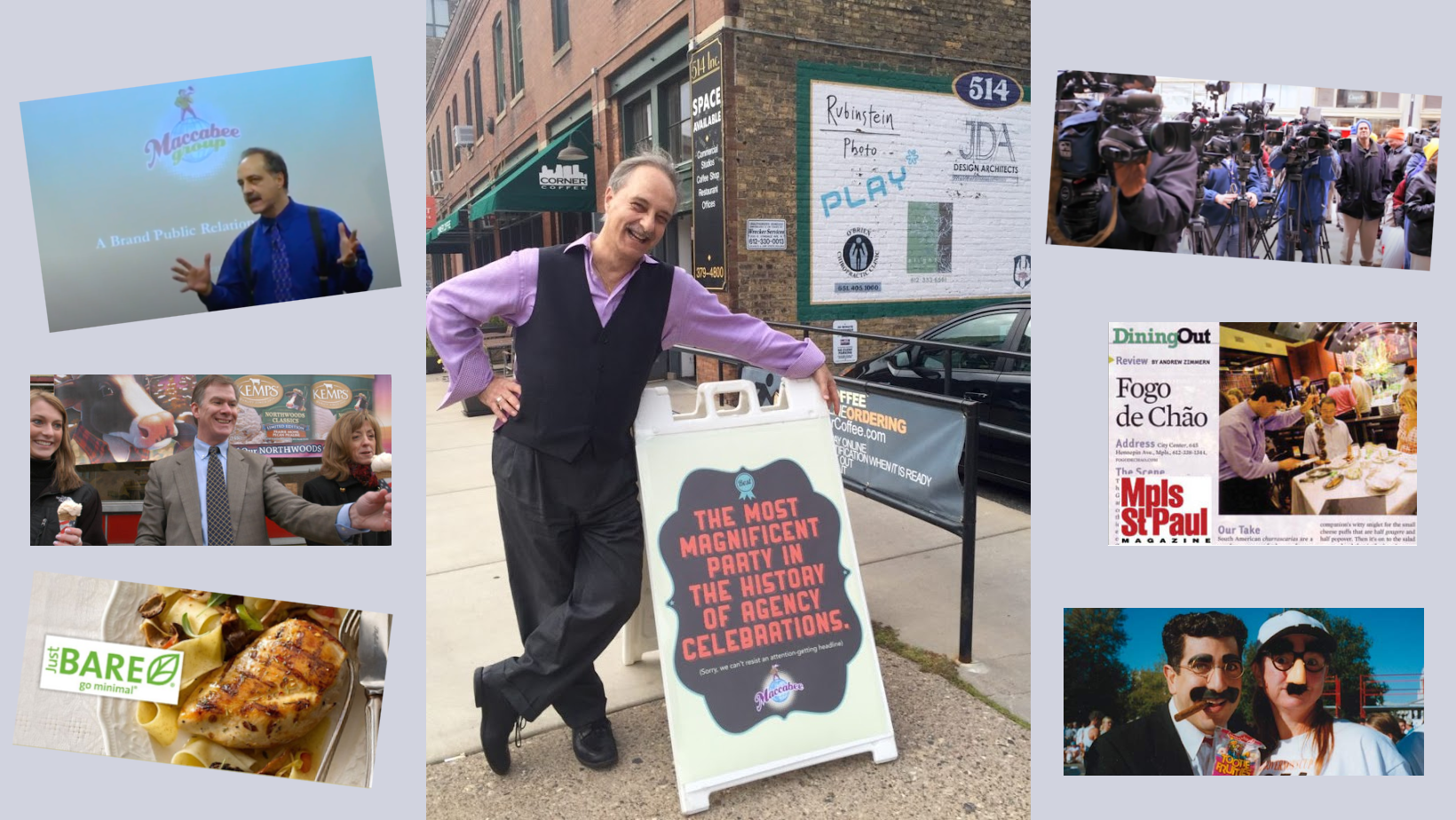Nine Marketing Secrets of Houdini and Other Master Magicians
Apple’s Steve Jobs, Facebook’s Mark Zuckerberg, Tesla’s Elon Musk, best-selling authors Seth Godin or Malcolm Gladwell, who are the business gurus that have inspired you? As president of the Maccabee agency for 24 years, I’ve been motivated by a different sort of advisor – Penn & Teller, David Blaine, David Copperfield and Harry Houdini (pictured right) . . . magicians, illusionists, and conjurors.
This admission is brought on by my half-century-long obsession with magic and my discovery of a book, How to Persuade People Who Don’t Want to Be Persuaded. Using magic as metaphors for business communication, the authors reveal secrets “from the world’s greatest persuaders – carneys, gamblers, hypnotists, and even magicians” that can be applied to your business life.
So what can you as a marketer or corporate communications professional learn from the magicians’ world of levitating supermodels and vanishing Bengal tigers? Plenty. Here’s proof:
1. Focus Narrowly to Achieve Greatness
British magician Derek Dingle, considered the greatest card magician of our time, had a vast repertoire of baffling magic effects. But when Dingle performed for the public (that’s you), he limited himself to fewer than six tricks. Other magicians acknowledge that Dingle “did those tricks better than any magician in the world.” The savviest marketing agencies I know in the Twin Cities – such as B2B marketing experts at Schermer and SEO wizards at Nina Hale/Collective Measures — strive to become extraordinary in a focused discipline, rather than losing themselves in the wasteland of being a “full-service, integrated and results-focused” agency. Successful branding favors those marketers who identify what their products or companies are not and then focus on what they can do better than anyone in the business world. To learn more about focusing your brand, check out an exquisite book, Take A Stand For Your Brand.
2. The Magic of Persuasion Happens In The Mind
Teller (of the magical duo Penn & Teller) and others argue that magic happens not on stage but in the spectator’s mind. Whether the elephant has vanished or not, if your audience believes the elephant has vanished, that pachyderm is gone. That observation requires marketers to think not about what a customer is seeing you do and hearing you say, but how they process what you do and say in their mind. If you want to research this further, read Sleights of Mind: What the Neuroscience of Magic Reveals About Our Everyday Deceptions, which suggests ways that you can hack into a person’s cerebellum to “use your mind’s own intrinsic properties against you in a form of mental jujitsu.” Can you imagine how your product or brand appears off the shelf or website and inside your consumer’s brain?
3. Reading Clients Like A Magician
Dingle, Slydini, Copperfield, and other magicians I’ve seen up close are masters of misdirection – drawing your attention away from where they don’t want your eyes to turn. But they are also observers of the physical “tells” that reveal your state of mind – noticing if an audience member is bored, baffled, or distracted and then manipulating their attention. Similarly, I’ve attended 100 agency new business presentations and it’s clear the #1 secret of winning new clients comes down to those agencies that develop the ability to read decision makers and then direct their focus to precisely where they want their attention. Fine-tune your ability to understand clients and prospects by picking up former FBI agent Joe Navarro’s What Every Body Is Saying: An Ex-FBI Agent’s Guide to Speed-Reading People.
4. Overcoming Insurmountable Obstacles
Anytime I feel stymied by the challenges of managing a business or marketing a product, I think of Argentinian magician René Lavand. René dazzled audiences on TV’s “The Ed Sullivan Show” and the “Tonight Show with Johnny Carson,” along with audiences across Europe. But René’s dexterity was made all the more astonishing when you realized that Lavand had only one hand. The story of how Lavand overcame a childhood accident to become one of the foremost magicians in Europe puts most of our far less daunting challenges into perspective. More recently, sophisticated sleight-of-hand performer Michael Vincent went public with the story of how one morning he woke up and discovered that he’d lost his hearing virtually overnight (“The life I knew with hearing died the morning I woke up with sudden, dramatic hearing loss”). Yet even with the requirement to read lips, remains one of the most enchanting magicians in America [Must-see video: “Life as a Deaf Magician”]. As self-defeating as self-pity can be, gratitude for what we have can be a springboard for success in business.
5. Touch Your Customer Emotionally
David Copperfield creates iconic illusions that are designed for emotional impact and symbolic power. While other magicians do penetration effects, Copperfield walked through the Great Wall of China. Other magicians make coins disappear, Copperfield made the Statue of Liberty vanish. Copperfield follows the tradition of Houdini, who didn’t just escape from any jail cell, but liberated himself from the cell that once held the assassin of President McKinley. Houdini also was sewn inside a beached whale, escaping like the biblical hero, Jonah. Too much marketing content – from blog posts to YouTube videos – is sleep-inducing and humorless. Be the marketer who guides your audience toward an emotional (as well as financial) payoff in marketing campaigns. If a customer’s eyes fail to dilate and their heart rate doesn’t soar in response to your campaign, we have failed as marketers.
6. Be Utterly Unique in Your Brand Position

Credit: Christopher DeVargas
I’m fond of this quote from the great British wit Oscar Wilde: “Be yourself, everyone else is already taken.” But anyone who walks through a supermarket to view aisles of virtually identical packaging – or visits several competing websites to witness the dreadful sameness of each online page – recognizes that it takes bravery to embrace a unique brand position. No magician exemplifies the drive for standing apart, inimitably, better than John van der Put, who performs today in Las Vegas as Piff The Magic Dragon. Self-billed as “The Loser of Americas Got Talent,” Piff’s a profoundly hilarious and grumpy magician dressed head to toe in a sordid dragon suit armed with a chihuahua named Mr. Piffles. There is no one like him, as you’ll see in this video. During a recent podcast interview, Piff explained how he chooses his on-stage material. Piff asks himself if the trick he does is something the audience will “talk about afterward, and say: ‘I went to the Piff the Magic Dragon show and. . . he shot a dog out of a cannon, or he put a dog in a straight jacket, or his dog solved a Rubik’s cube.” In other words, there’s only one magician on the face of the earth shooting a chihuahua out of a cannon. Is your brand courageous enough to be that singular?
7. Don’t Be Best at Marketing, Strive Just To Be A bit Better – Each Day
What can Matisse, Van Gogh, and Picasso teach us about marketing? Consider the advice of Tel Aviv-born mindreader Asi Wind who, in addition to being a world-class magical performer, is also a fine painter (ah, now you might see where this is heading. . . ). “I learned a ton from art and painting that was applicable to magic,” muses Asi. “One thing my art teacher said is, “don’t strive to be good, strive to be better.’ That stuck with me, I tell magicians at my workshops, you’ll never be good, you can only be better. That tells you that there is no end result. You’ll never get to a point where you say, I am wonderful now. You’re just a bit better than yesterday!” All of us dream of achieving a pinnacle – say, winning a Clio and an Emmy and being named Advertising Age’s CMO of the Year. Perhaps it’s wiser to pledge instead: 365 days-a-year, we’ll be better than the previous day.
8. Leverage the Marketing Power of Names
The late Eugene Burger (below), who was named “Close Up Magician of the Year” twice by the Magic Castle, taught the psychology behind close-up magic. What more valuable skill could you have as a business person than the ability to connect in your first seconds of meeting with a CEO or customer? That’s what Burger did as he performed in his hometown of Chicago and across the world, leveraging eye contact, a memory for names and an understanding of human dynamics. “When I sit down at a table to perform magic for strangers, the very first thing I want to do is find out their names,” writes Burger in his book, Mastering The Art of Magic. “People deeply enjoy hearing the sound of their own names…knowing a person‘s name is power.” (If you have difficulty remembering names, check out The Memory Book: The Classic Guide to Improving Your Memory at Work, At School and At Play by Harry Lorayne – who also happens to be one of the most acclaimed card magicians in the world!)
9. Believe In the Impossible
Finally, every day in business I’m buoyed by the optimism of the Canadian illusionist Doug Henning, who said: “If we all live with a sense of wonder, our lives will become filled with joy.” When our agency wrestles with a marketing conundrum, my mind turns to the naïve but inspiring monologue Henning shared during the finale of his “World of Magic” shows: “Anything the mind can conceive is possible. Nothing is impossible. All you have to do is look within, and you can realize your fondest dreams. I would like to wish each one of you all of life’s wonders and a joyful age of enlightenment.”
This is a revised and updated version of a MaccaPR blog post that appeared in 2015.

